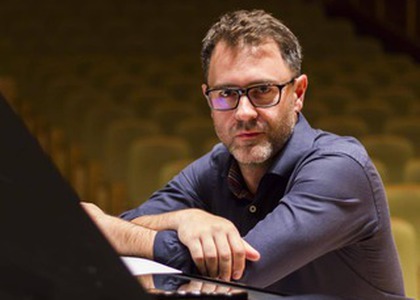> [Archived] Interviews

Interview with pianist Ștefan Doniga
Today, 15th of January 2023, on the occasion of the National Culture Day, the "Top 5 Romania" tour starts, performed by violinist Diana Jipa and pianist Ștefan Doniga. He gives us more information about the itinerary of the project and more, in a dialogue with Sarah Natsis:
Mr. Ștefan Doniga, as the name of the tour says, the recitals you are giving from today until the 26th of January will focus on five of the most famous Romanian musicians of all times. To begin with, I'd like you to tell us how the idea for this project came about, and how you came up with the aforementioned ranking?
The idea was born by looking around me, looking around us and asking the question that I'm sure you and many of our listeners are asking yourselves: "How do we pass on our set of values?" Because we see - sometimes with joy, sometimes with concern - this fact, that the values we believe in are more or less being passed on, and if we are to have a future to look like us or a future to trust in, it can only be saved by young people, by those who come after us. And it is up to us to pass on this set of values. That's where this idea came from, from the intention to leave, to those younger than us, our idea, those of us who believe in culture, our idea about culture, what culture actually means to us. And we can't limit ourselves to just showing some models, to talking (in our case) about some composers, which is more or less a centre of interest for young people. We can't limit ourselves to this somewhat passive-aggressive attitude, I would say, of listing some values and if young people adhere to them - fine, if not - not. We have to adapt these values to their needs, we have to mould ourselves to their perspective of the future. That's how this idea was born.
The ranking is absolutely obvious to us, those of us who are somewhat in touch with the music phenomenon, and again it comes in relation to the intention of the project: what is important to so many of today's young people? Where does the ranking actually take place? Through fame. Let's see who were the most famous and who are still the five most famous Romanian musicians of all times! Are they part of the contemporary elite? And if we go statistically and historically we will see that, in fact, these five creators, five people who have been appreciated by the whole world are the ones we have noted in this project - Dimitrie Cantemir, Anton Pann, Ciprian Porumbescu, George Enescu and Dinu Lipatti.
In addition to the chamber music recitals, there will also be lectures on musical and other topics. Tell us about the related elements included in this project.
These conferences will develop exactly what I told you earlier. In fact, where does the fame of these composers come from and why is it relevant to our young listeners, our young pre-students. Because, these values that we believe in and that we aspire to pass on have been cultivated to a level that has been truly appreciated around the world. And we're not going to give information that's easy to find online, we're going to talk about things that are important to young people. For example, we will say that Dimitrie Cantemir is the first composer of manele in Romanian music, but he is the composer of that Fanar manea, it is that noble, aristocratic genre, which has nothing to do with what modern terminology confuses, in fact, with what we could call Turbo-folk, to call it in scientific terminology. Or to say that Anton Pann is the creator of lute music. That Ciprian Porumbescu is one of the Romanian composers who has reached over a billion listeners, being the soundtrack of a film that was broadcast in China with such a large audience. And how many and how many more such information that are attractive, that come and complete a set of needs of the young audience. Beyond these conferences on these topics, hopefully of interest to the young audience, there will also be meetings not only with young people, not only with students, but also with teachers. These conferences will not be given by me or us, but by teachers and cultural managers from the cities we will visit.
There will be these recitals that we will make a kind of concert-lesson, but it's too much up "lesson" and too pretentious, after which, there will be video releases, as we are used to our audience. Each day of the recital there will also be a video release of one of the songs on the programme.
The opening event of the tour takes place today at the "Nicolae Bălănescu" Athenaeum in Giurgiu. What will be its course in the next period?
Today is the opening, at 14:00 in Giurgiu, with the launch of a video. Then, on the 17th of January, we will be at the "Iosif Sava" secondary school in Bucharest. On Friday January 19th, we will be in two places: at the wonderful Athenaeum in Tecuci at 12:00, and then at 17:00 at the "Unirea" High School in Focșani. And we'll finish one Friday later, on the 26th of January, in Pitesti, at the 13th Primary School.
Translated by Andreea Iulia Udroiu,
University of Bucharest, Faculty of Foreign Languages and Literatures, MTTLC, year II
Corrected by Silvia Petrescu














